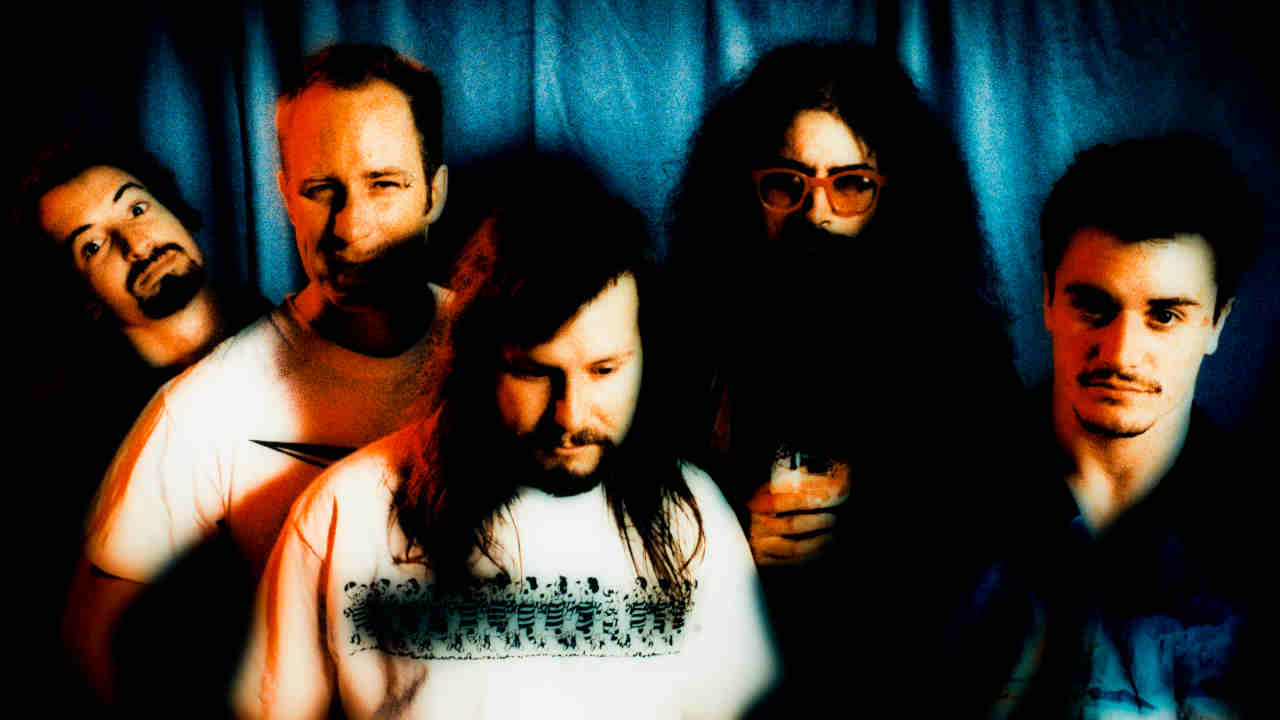"At first I thought Meshuggah were absolute noise, just trash!": Periphery's Misha Mansoor talks early influences, the benefits of social media and internet trolls
Periphery founder and guitarist Misha Mansoor shares the wisdom that helped his band become djent pioneers

Although Meshuggah are the first name people think of when they hear the term ‘djent’, the genre would not have proliferated the way it did without Misha Mansoor. The Periphery guitarist describes his younger self as “just an idiot making music in his bedroom”, but his riffs gaining notice through the growing landscape of MySpace helped establish his band as leaders for a new school of progressive metal brilliance.
Misha has maintained his status as one of metal’s most ingenious guitarists ever since, Periphery flourishing beyond their initial Meshuggah worship into a distinct brand of tongue-in-cheek intensity. With the band’s 20th anniversary looming, Hammer caught up with Misha to find out what makes him tick, and what words of wisdom have helped him along the way.

GROWING UP SOMEWHERE DOESN’T MAKE IT HOME
“I grew up in Washington DC but, when I was eight, we moved to Belgium for three years. It was because of my dad’s work, he was an economist for the World Bank. I think I had a good set-up in Belgium when I left; going back to DC, that sucked. That was a bad roll of the dice for me. People didn’t like me very much and I didn’t know why. I think I had a bit of a French accent. I didn’t really care about how I dressed or how I looked, and I was very quickly reminded that I should probably start caring about those things.”
LACK OF CHOICE CAN FOSTER A SENSE OF COMMITMENT
“There’s a very romantic aspect to CDs, but one can’t deny the benefits of being able to discover new music online. I remember, even if I didn’t like an album, I’d listen to it, especially if I’d bought it with my allowance. I didn’t get a lot of allowance. Sometimes you’d buy an album based off the cover and, if you didn’t like it, it’s kind of like, ‘Alright, well… I’d better enjoy it.’ It’d be a while before I had the money to buy something else and do something about it.”
SOME BANDS REQUIRE MORE COMMITMENT THAN OTHERS!
Sign up below to get the latest from Metal Hammer, plus exclusive special offers, direct to your inbox!
“I thought Meshuggah were absolute noise, just trash! I didn’t understand them until I spoke to a friend of mine, who was a very talented bassist, and asked, ‘Why’s everyone obsessed with Meshuggah?’ He went, ‘Their thing is that everything they do is in 4/4, it just doesn’t sound like it.’ That’s when I was like, ‘Oh, Jesus! I think this may be a big shift in my life.’ And it was!”
PERSISTENCE IS KEY
“In college, I was basically skipping all my classes, because I discovered that I could turn my gaming computer into a recording computer. That’s how I convinced my parents that music is important to me. I said, ‘Look, I don’t care about any of these subjects, and I care more than anything about this. No matter which field you choose, it’s going to be competitive, so why not chase a field where you have a fighting chance?’ That’s what made them a bit more open and showed that I had a good leg to stand on.”
USE ALL THE TOOLS THAT ARE AVAILABLE TO YOU
“I can’t really tell you what it was like [as a recording artist] before MP3s and MySpace, because I didn’t know anything else, MySpace just… was. By the time I was putting out music, it was directly in the MP3, soon-to-be-streaming era, so I don’t really have anything to compare to.”
SOCIAL MEDIA IS STILL GREAT FOR METAL
“I think TikTok is responsible for bands like Sleep Token blowing up, and it’s fascinating to watch. It’s cool to see how huge they’ve gotten, because they’re still a metal band and they’re becoming more mainstream, and that’s good for everyone. It’s nice to see the glass ceiling being raised a bit.”
YOU CAN’T JUST BURY YOUR HEAD IN THE SAND
“The rise of MP3s was wrecking labels. They were trying to figure out how to be solvent, because all of a sudden the money that was coming in was substantially less. There was a bunch of labels that were stubborn, like, ‘This MP3 thing is a fad, it’ll go away.’ Maybe that’s what they needed to believe, because otherwise their empire as they knew it would fall.”
THE INDUSTRY DIDN’T ‘GET’ US
“It took about three years before, eventually, Sumerian was like, ‘What’s it gonna take?’ [For Periphery to sign with the label.] I went, ‘A licensing deal’, and we worked that out. Sumerian were pretty fantastic in the States, but pretty terrible in every other territory. It was funny, because [A&R legend] Monte Conner was at Roadrunner, and I don’t think he ever fully understood us.
I think it was always the people working under him who were like, ‘You’ve gotta sign Periphery.’ We quickly signed a [distribution] deal for Canada with this small label called Distort, but, as soon as someone did offer us that deal, Roadrunner came around. They were like, ‘Alright, we’ll take whatever territories you still have.’”
WE NEVER WANTED TO CREATE SOMETHING WE COULDN’T REPLICATE LIVE
“The joke was, Periphery have three guitarists because I couldn’t have four. Ha ha! When I started recording, I had a recording computer and all these tracks, so I started to go nuts! It started to get to the point, especially with the first album [2010’s Periphery], where it was like, ‘We will have to put stuff on backing tracks when we play live.’ But that would have been lame.”
I DIDN’T GET A HANDOUT FROM MY DAD – I GOT A LOAN
“My dad never gave me money; he’d always give me a loan at market rate. He helped us buy our first van, but we paid him back with interest. That was a good thing. It gave us a leg up when every bank we went to laughed at us.”
HAVE FUN
“I really wanted to give [2016’s] Periphery III the subtitle ‘3 Fast 3 Furious’. I like ‘3 Fast 3 Furious’ so much that I’m gonna suggest it again for Periphery VI, because it’s just even more absurd. A good one [for new album Periphery V: Djent Is Not A Genre] was ‘When I Say Squeeze, Squeeze… Squeeze’. That’s funny to five people in the world. Maybe six.”
DON’T EVER TREAT MUSIC LIKE A JOB…
“I was actually quite happy when I was working a sales job at Radioshack and making music in my free time. And I remember [while touring after Periphery III], looking back and being like, ‘I think I’m less happy now,’ because I was making music on someone else’s schedule. It had nothing to do with whether I’m feeling creative or feel like writing. It got to the point where I was kind of like, ‘Maybe I shouldn’t be in this band anymore.’”
…BE SURE TO TREAT IT LIKE A HOBBY INSTEAD
“It took recalibrating a little bit and being like, ‘I’m treating this too much as a job.’ We made some pretty big changes: we got a new manager, who’s our manager to this day, and who we pretty much would not do the band without. We started our own label. We took a bit more control of our own fate.”
BEING AN ‘INTERNET BAND’ DOESN’T MAKE HATEFUL COMMENTS LESS HURTFUL
“If someone’s just hating or trolling, that doesn’t get to me. I think the things that get to me are when people try to claim that we didn’t try. It hurts because I know how hard [making a Periphery album] is and how much we work.”
MUSIC IS ABOUT CONNECTION
“If it weren’t for the pandemic, Periphery V would’ve been very easy to do. It made us feel separated and we kept trying to work apart. We learned that we can’t do that. We’ll never make that mistake again. We got 80% there, but 80% there and no complete songs after a year and a half does not feel good. It took us being able to meet up to make progress.”
PERIPHERY HAVE NOTHING LEFT TO PROVE
“I don’t think we’ve ever been about proving ourselves, other than maybe the first album. I never thought Periphery would get anywhere near as big as we have. All of this is just icing on the cake. This cake is mostly icing at this point.”
Periphery V: Djent Is Not A Genre is out now via 3Dot.

Louder’s resident Gojira obsessive was still at uni when he joined the team in 2017. Since then, Matt’s become a regular in Metal Hammer and Prog, at his happiest when interviewing the most forward-thinking artists heavy music can muster. He’s got bylines in The Guardian, The Telegraph, The Independent, NME and many others, too. When he’s not writing, you’ll probably find him skydiving, scuba diving or coasteering.
